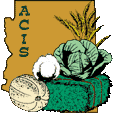 |
|
|
|

|
|||
| |
|||
Lepidopterous larvae, including beet armyworm, Spodoptera exigua, cabbage looper, Trichoplusia ni, and corn earworm, Heliocoverpa zea, are major pest of leafy vegetables grown in the desert southwest. Typically, larval populations begin infesting newly planted produce stands soon after plants emerge in early September and can remain heavy through early November under favorable weather conditions. Fortunately for local PCAs, several insecticide alternatives are available that provide excellent residual activity on this pest. Furthermore, many of the products have different modes of action (MOA) that can be alternated throughout the growing season. Thus the rapid development of resistance by lepidopterous larvae, and in particular beet armyworm, to any of these insecticide compounds should not readily occur. However, if an insecticide compound, or products with the same MOA, are used repeatedly for Lep control in the same field, the risk of resistance increases significantly. This is particularly important with the Diamide group of insecticides (IRAC group 28) because these products can be applied as both foliar sprays and soil injections, and because there are currently six Diamide products labeled in leafy vegetables with the same MOA (Coragen, Durivo, Voliam Xpress, Voliam Flexi, Synapse and Vetica). Applying these Diamide products to the soil at planting, and applying them as foliar sprays in the same field, can expose multiple generations of Lep larvae to the same MOA. Thatís not a good way to use these products if you want them to remain effective for more than a couple of years. Since the Diamides, as well as the other products currently available (Radiant, Proclaim, Intrepid, Avaunt), are critical to effective management of Lep larvae in leafy vegetables, PCAs should consciously avoid the overuse of any of these compounds. The most effective way to delay the onset of resistance by BAW in leafy vegetables is to consider the recommendations provided in the guidelines recently prepared entitled Insecticide Resistance Management Guidelines for Beet Armyworm in Lettuce.. Remember: When in Doubt-Scout. Click picture to listen to John To contact John Palumbo go to: jpalumbo@ag.arizona.edu
|
|||
| Back | |||
For questions or comments on any of the topics please contact Marco Pena at the Yuma Agricultural Center. |
|||
| Home | Cotton
| Veggies | Forages
| Grains | Citrus
| Crop x Crop Insects | Diseases| Weeds | Pesticides | Economics | News | Weather | Research | Photos | Contacts | General Info. Copyright © 2001 University of Arizona, College of Agriculture and Life Sciences Webmaster: Al Fournier (acis@ag.arizona.edu) |
|||
